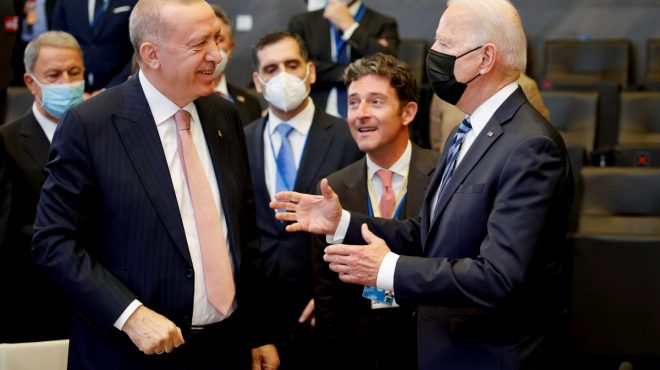After meeting US president, the Turkish leader says no Turkey-US issue cannot be resolved, despite months of animosity.
Turkish President Recep Tayyip Erdogan said on Monday he held a “fruitful and sincere” meeting with his US counterpart Joe Biden on the sidelines of the NATO summit in Brussels.
“We believe there is no problem that cannot be resolved in Turkey-US relations,” Erdogan added after holding his first meeting with Biden since his election.
At a press conference on the sidelines of a NATO summit in Brussels, Erdogan said the “extensive talks” with Biden covered cooperation on regional issues and he emphasized his long years of friendship with the US leader.
In a brief exchange with reporters, Biden described it as a “very good meeting”. He and Erdogan met privately before being joined by other officials. They spent in total more than an hour together.
The US president later told reporters that the discussion was “positive and productive”. He said the leaders “had detailed discussions about how to proceed on a number of issues”, but did not go into much further detail.
Biden has known Erdogan for years but their relationship has frequently been contentious. During his election campaign, Biden drew ire from Turkish officials after he described Erdogan as an “autocrat”.
In April, Biden infuriated Ankara by declaring that the Ottoman-era mass killing and deportations of Armenians was “genocide” – a term that US presidents have avoided using.
Erdogan signalled that the two leaders failed to find a way to overcome differences over Turkey’s purchase of the S-400 advanced Russian missile defense systems. The US says the technology is a threat to NATO and has removed Turkey from its F-35 fighter jet programme.
“Our thoughts on the S-400 are the same as before, I relayed our same thoughts to Mr. Biden,” Erdogan said.
Erdogan also called for an end to US support to Syrian Kurdish armed groups, which Turkey considers to be “terrorists”.
One area where Erdogan hoped to showcase a central Turkish role in NATO is Afghanistan, where Ankara has offered to guard and operate Kabul airport after US and NATO forces withdraw in coming weeks. NATO head Jens Stoltenberg said Turkey would play a key role but no decision was made at the Monday summit.
Meeting with Macron
Before meeting with Biden, the Turkish president also met other world leaders during the summit, including German Chancellor Angela Merkel, British Prime Minister Boris Johnson, and French President Emmanuel Macron.
Macron tweeted that he wants to “move forward” with Turkey towards a demanding and respectful relationship, after the meeting.
It was their first meeting since the dispute between the two countries reached its peak in October after Erdogan questioned Macron’s mental health.
J’ai pu évoquer le cas de notre compatriote Fabien Azoulay. Les conditions d’un transfèrement rapide avancent et je l’espère nous permettront d’aboutir dans les meilleurs délais. La discussion de ce matin produit des résultats d’ores et déjà utiles. https://t.co/8jG1AQ2wKg
— Emmanuel Macron (@EmmanuelMacron) June 14, 2021
Macron said he wants all NATO allies to make a clear commitment to the military organisation’s values, principles, and rules, his office said.
Both men discussed issues in Libya and Syria, Elysee said. Macron has notably accused Turkey of flouting its commitments by ramping up its military presence in Libya and bringing in armed fighters from Syria.
Macron also highlighted that France’s secularism respects all religions, including Islam.
The French presidency said a “clarification” was needed in response to Erdogan’s tough criticism of Macron’s attitude towards Islam and Muslims.
In other developments at the summit, NATO members committed to confronting China’s military ambitions for the first time, issuing a communique that said Beijing presents “systemic challenges” for the transatlantic security alliance.
NATO’s communique also said the alliance would adapt to climate-related security challenges, called on Russia to drop its designation of two allies – the United States and the Czech Republic – as “unfriendly countries” and urged Iran to stop all ballistic missile activities.
 Alghadeer TV Alghadeer TV
Alghadeer TV Alghadeer TV

